Mutual Learning·Co-Creation·Future: The 2025 China-France Image Dialogue Series Concludes Successfully
In the autumn of Beijing, light and shadow danced in a captivating rhythm. From September 22 to 24, 2025, the "Images En Mouvement: Dialogue Chine-France" series, as a highlight of the 2025 Beijing Culture Forum, was successfully held in Beijing. This three-day event commenced with a concert tracing a century of cinematic history, followed by five high-level dialogues featuring leading directors, scholars, and artists from both countries for in-depth discussions on film narrative, heritage preservation, and industry future, and concluded with a salon focused on the spirit of the era and opportunities for collaboration.
This cultural extravaganza not only reviewed a century of cinematic exchange and mutual learning between China and France, but also, with its vibrant contemporary relevance, injected unique vitality and inspiration into the cultural interactions between the two countries.
Light and Shadow as the Bridge, Music as the Vessel: China-France Cine-Concert Sounds the Eternal Movement of Civilizational Dialogue
On the evening of September 22, "Un siècle de cinéma en musique - Ciné-concert Chine-France" held at the Beijing Zhongshan Park Concert Hall officially inaugurated the "Forum Culturel de Beijing 2025 - Les rencontres du cinéma: une épopée franco-chinoise".
The event was graced by distinguished guests including: Shen Haihong, Vice Minister of the Publicity Department of the CPC Central Committee and President and Editor-in-Chief of China Media Group; Li Wentang, Vice President of Party School of the Central Committee of CPC and Vice President of the National Academy of Governance; Chen Mingjie, Director of the Culture and Arts Bureau of the Publicity Department of the CPC Central Committee; Mao Yu, Executive Vice Director of the Film Bureau of the Publicity Department of the CPC Central Committee; Jean-Pierre Raffarin, Former Prime Minister of France and Special Representative of the French Government for China; Sophie Rotkopf, Vice President of the Auvergne-Rhône-Alpes Region, France; Florent Aydalot, Minister-Counselor for Cultural, Educational and Scientific Affairs at the French Embassy in China and Director of the French Cultural Centre in Beijing; Guillaume Roy, Consul General of the French Embassy in China; Jean-Jacques Annaud, French film director; and Juliette Binoche, French actress.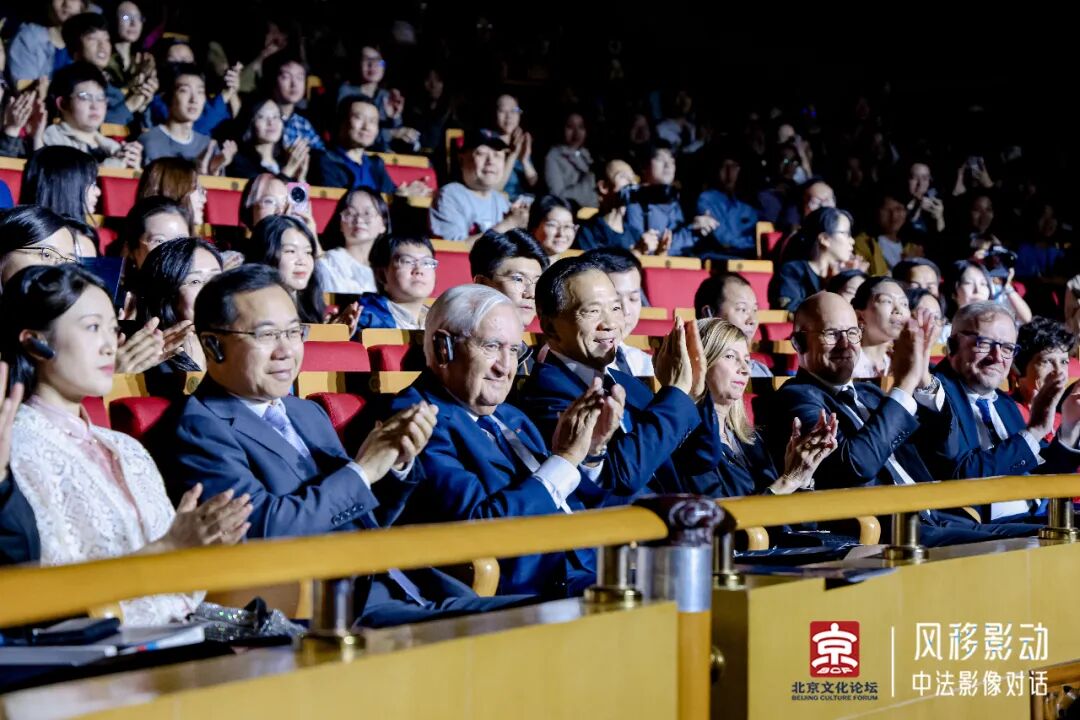

In the hall of music, light and melody intertwined like poetry, as history and the present embraced tenderly. Precious footage connected the flowing river of cinema: Juliette Binoche and Liu Mintao introduced early glimpses of China at the turn of the century; Carmen Chaplin, inheritor of a cinematic legacy, brought fragments of 1937 Beijing; while the French Cinémathèque contributed its collection of early Chinese film treasures, veritable "living fossils". The concert paid heartfelt tribute to Dingjun Mountain, the pioneering work of Chinese cinema starring Peking Opera master Tan Xinpei, demonstrating how Chinese film has been intertwined with music since its inception. Mr. Tan Xiaozeng, the sixth-generation heir of the Tan School, graced the stage to recount the family's cinematic history - five out of seven generations deeply connected to Chinese film. Mr. Tan Zhengyan performed an excerpt from Dingjun Mountain live. Though the film itself can no longer be seen today, his performance transported the audience through a tunnel of time - the film continues to live on through the Tan family's inherited artistry of song, speech, movement, and combat.
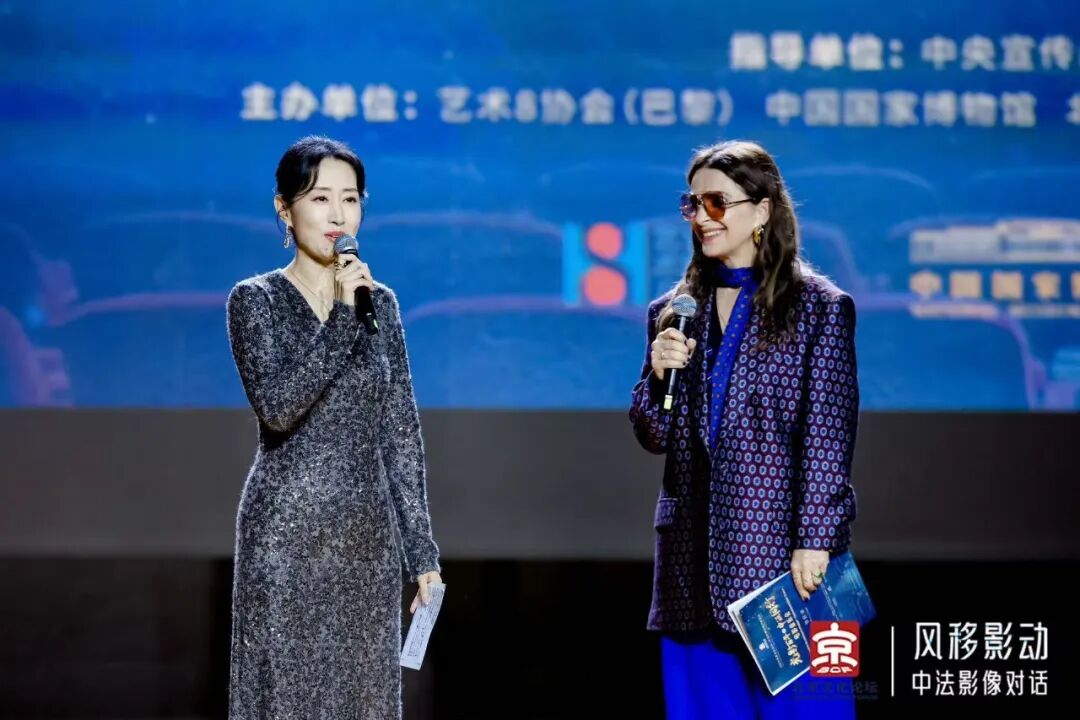
Juliette Binoche (right) and Liu Mintao (left)
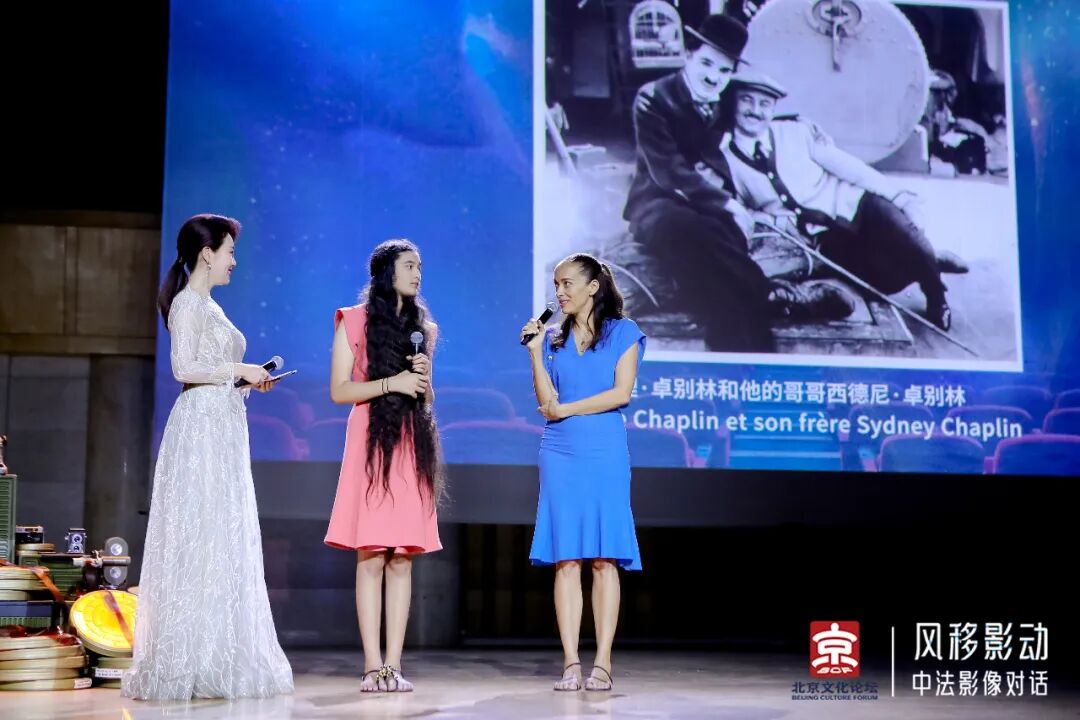
Carmen Chaplin (first from right) and Uma Chaplin (second from right)
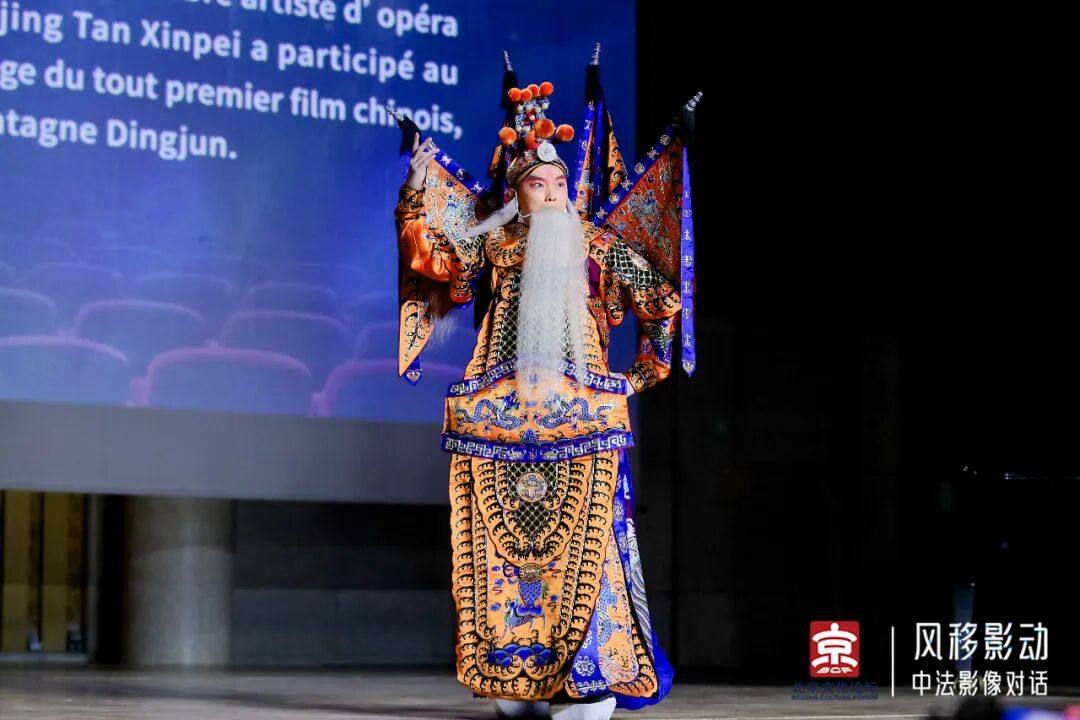
Tan Zhengyan performs an excerpt from Dingjun Mountain live
The co-production The Magic of the Kite (1958), jointly recommended by Chinese actor Liu Ye and his French wife Anaïs Martane, stands as the first Sino-foreign collaborative film of the People's Republic of China. It captures the innocence and dreams of filmmakers from both countries, planting the seeds of a lasting friendship. A decade later, French director Jean-Jacques Annaud reunited with actors Feng Shaofeng and Shawn Dou to reminisce about the epic Wolf Totem (2015). They shared the immense challenges behind its creation and their artistic insights. This landmark production signified a new zenith in the artistic and technical collaboration between China and France, becoming a paragon of deep bilateral cooperation in filmmaking.
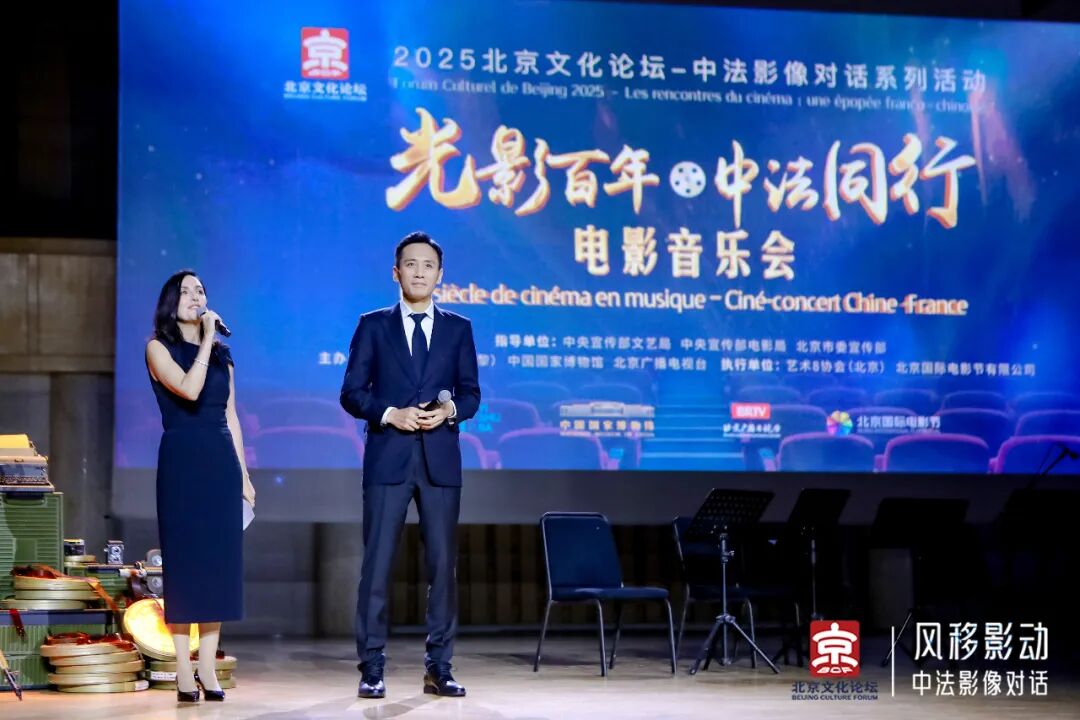
Chinese actor Liu Ye and his French wife Anaïs Martane
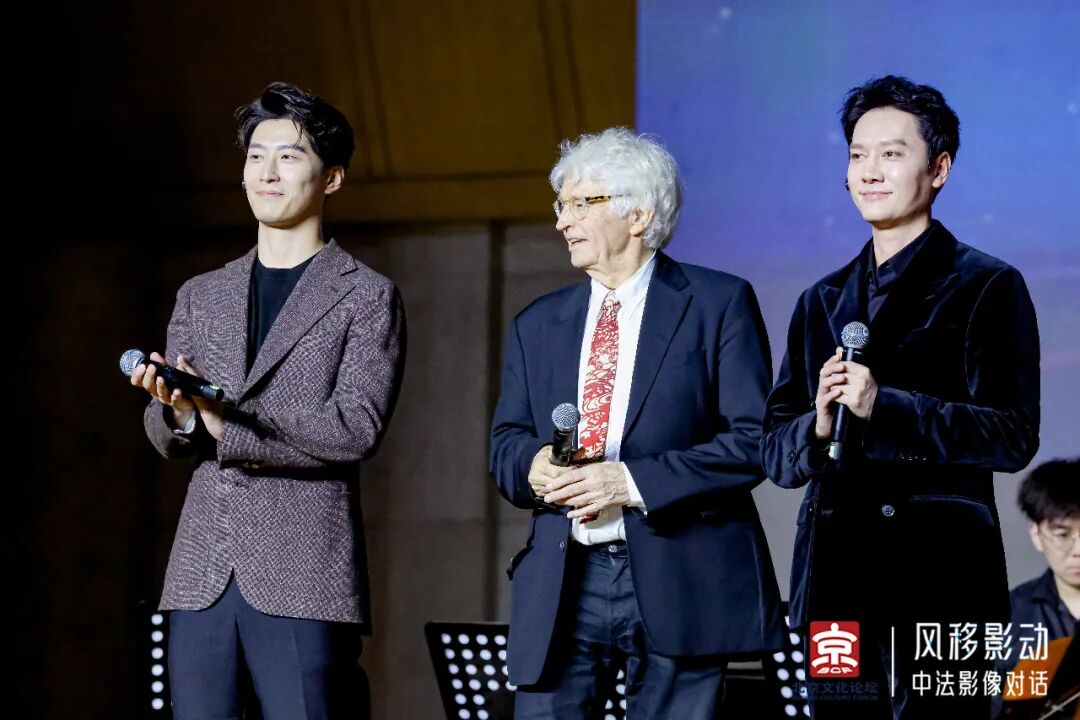
Director Jean-Jacques Annaud (second from left)
Actors Feng Shaofeng (first from right) and Shawn Dou (first from left)
Looking to the present and the future, director Wuershan and music director Monkodran took the stage to introduce the musical creation concept behind Creation of the Gods I: Kingdom of Storms (2023), a film that has sparked a viewing phenomenon in France. They elaborated on how traditional Chinese instruments were seamlessly blended with Western orchestral music, using a universal musical language to narrate an Eastern mythological epic. The film's overwhelming reception in France stands as solid proof of the widespread cultural resonance ignited by this innovative expression.
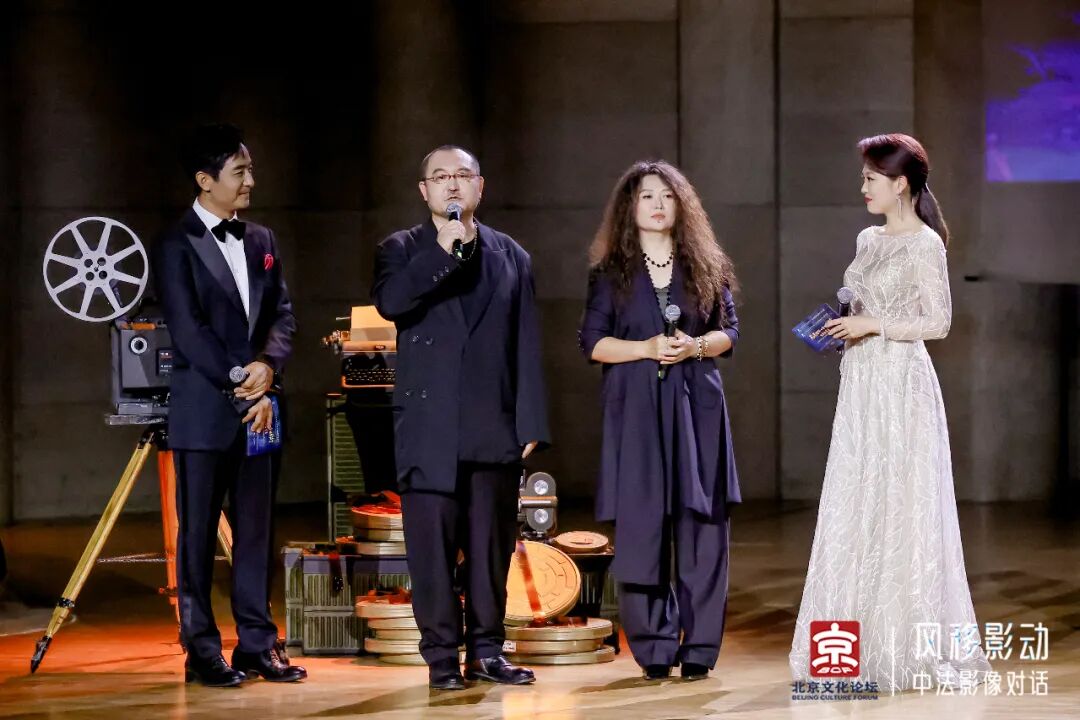
Director Wuershan and Music Director Monkodran
This concert transcends the boundaries of a typical artistic performance, serving as a profound practice of cultural identity affirmation and civilizational dialogue. It vividly recreates the century-long cinematic exchange between China and France by combining visual narrative and musical language. Furthermore, it positions film as a communicative medium that transcends temporal and spatial boundaries, serving as an emotional bridge between history and the present, East and West.
From the operatic roots of Dingjun Mountain to the innovative approach to traditional music in Creation of The Gods, the concert demonstrates the vitality of cultural tradition through creative transformation. The symphonic resonance of Chinese and French classic works highlights the universality of human emotions across different cultural contexts. The legacies of the Tan School art, the Mei School art, and the Chaplin family illustrate the enduring value of artistic spirit, transcending time and national borders.
A special gift exchange segment was featured during the concert. From the historical photograph of Charlie Chaplin and Mei Lanfang to the exchange of early Lumière footage and stills from China's earliest extant narrative film, this was not merely a physical transfer of world cinematic heritage, but also a sharing of cultural memory. It elevated the event from a "cultural showcase" to a "dialogue among civilizations".
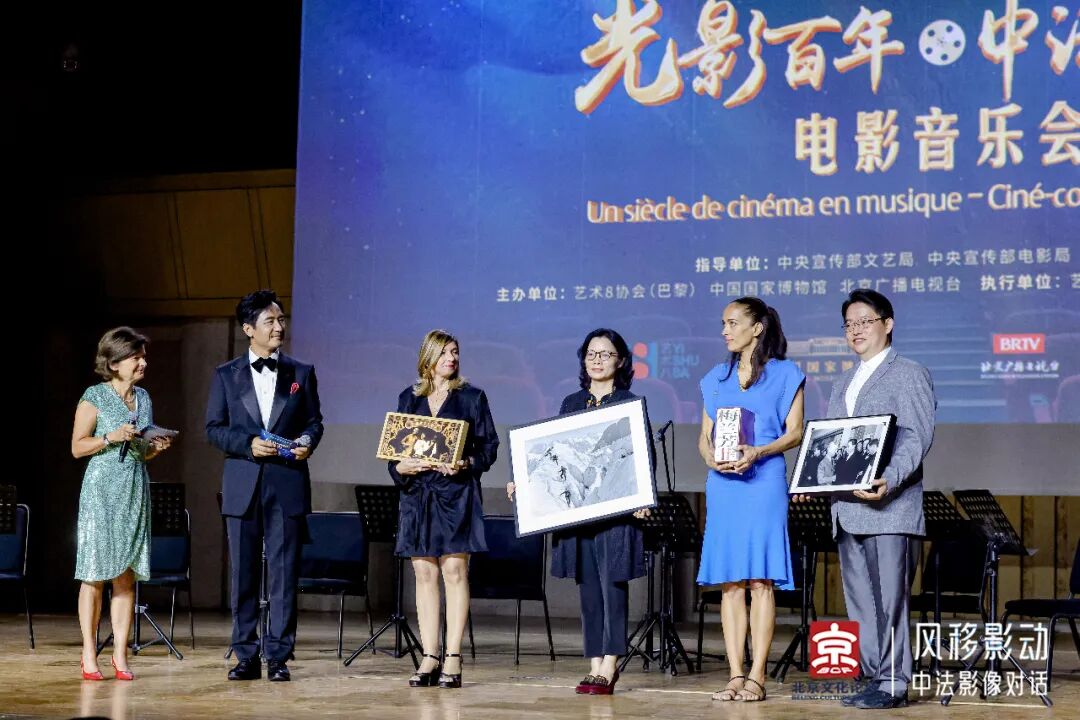
The gift exchange ceremony
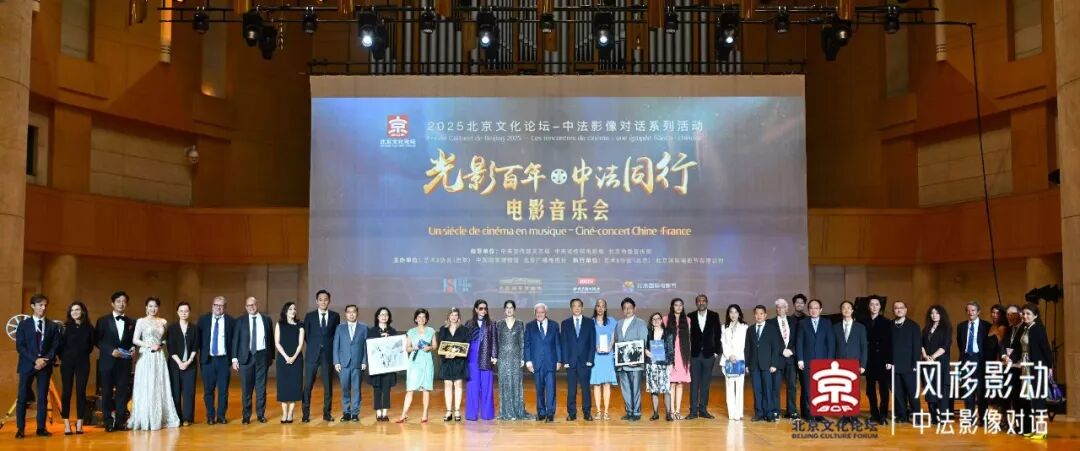
Group photo at the cine-concert
Cinematic Exchanges and Intellectual Dialogues: French and Chinese Film Masters Celebrate the Eternal Charm of the Silver Screen
As a highly anticipated international cultural exchange segment of this year's Beijing Culture Forum, the "Images En Mouvement: Dialogue Chine-France" held five high-level events in Beijing on September 23. The five diverse and substantial events featured historically significant and artistically valuable films, alongside specially invited top-tier directors, scholars, and practitioners from both countries. Engaging in discussions centering on film narrative, technological innovation, industry future, and cultural resonance, they provided audiences and industry professionals alike with an intellectual collision that transcended geographical and cultural boundaries.
Juliette Binoche made appearances at Peking University and the China Film Archive with her directorial debut, In-I In Motion. The film originates from her collaboration with choreographer Akram Khan on the dance theatre production In-I dating back to 2007. Through over a decade of accumulated footage and creative exploration, the work showcases the interactive process between the two artists across the fields of acting and dance.
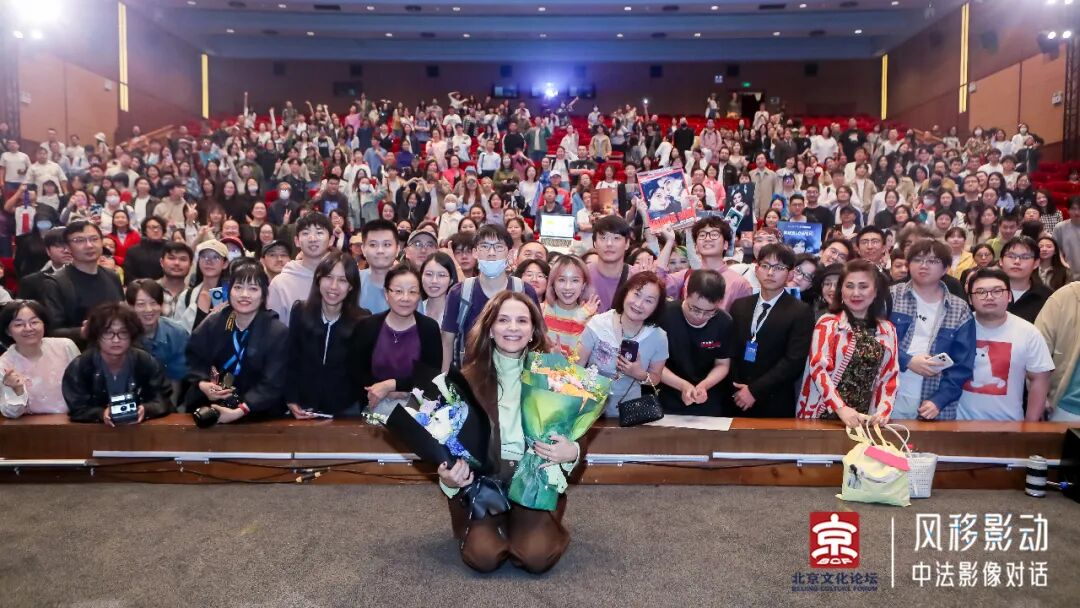
Juliette Binoche poses for a photo with the audience at the event
Juliette Binoche reflected on the entire process of distilling 170 hours of raw footage into her film. She deliberately abandoned traditional narration and scripts, allowing visuals and movement to take the lead in guiding the audience to independently experience emotional fluctuations and relational evolution. She emphasized that the film not only documents dance but also delves deeply into the elements of trust, conflict, and self-awareness within intimate relationships, reflecting a creative philosophy that "begins with the senses". Despite their vastly different backgrounds, she and choreographer Akram Khan maintained mutual respect and bridged their disparities through improvisation, resulting in a successful global tour with over a hundred performances.
Juliette Binoche repeatedly highlighted that artistic creation should align with inner feelings rather than conform to external demands. She believes that genuine intimate relationships should embrace mutual differences, and that film, as an art form, should be measured not by box office revenue or audience size, but rather by the work's spiritual core and humanistic care.
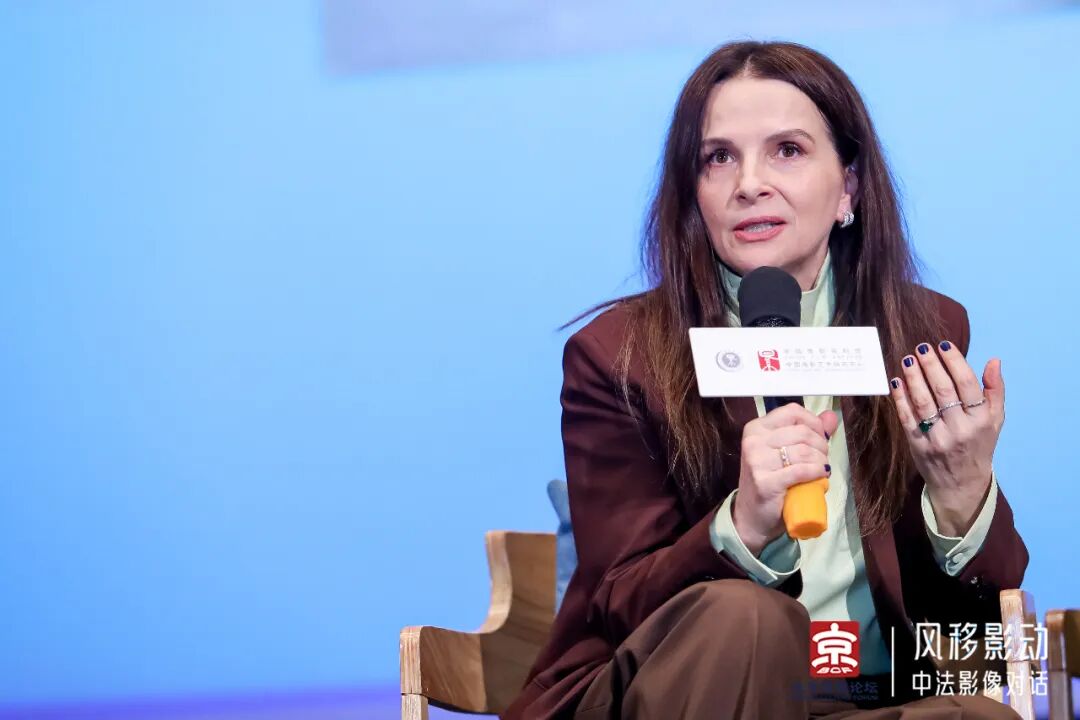
Juliette Binoche
As the President of the Jury at this year's Festival de Cannes, Juliette Binoche specifically discussed Resurrection. She expressed that the work possesses astonishing imagination and remarkable originality in its aesthetics. Although this piece was introduced to the jury late in the process, its powerful artistic resonance eventually won over all of the judges. She described it as an auteur film that "defies categorization".
Binoche encouraged young people to boldly express their authentic selves and stay true to telling valuable stories. Both dialogue sessions demonstrated her acute sensitivity to emotional expression as a cross-disciplinary artist, as well as her consistent commitment to creative authenticity and depth of humanity. This resonated with audiences across diverse cultural contexts, evoking reflection on art, relationships, and personal growth.
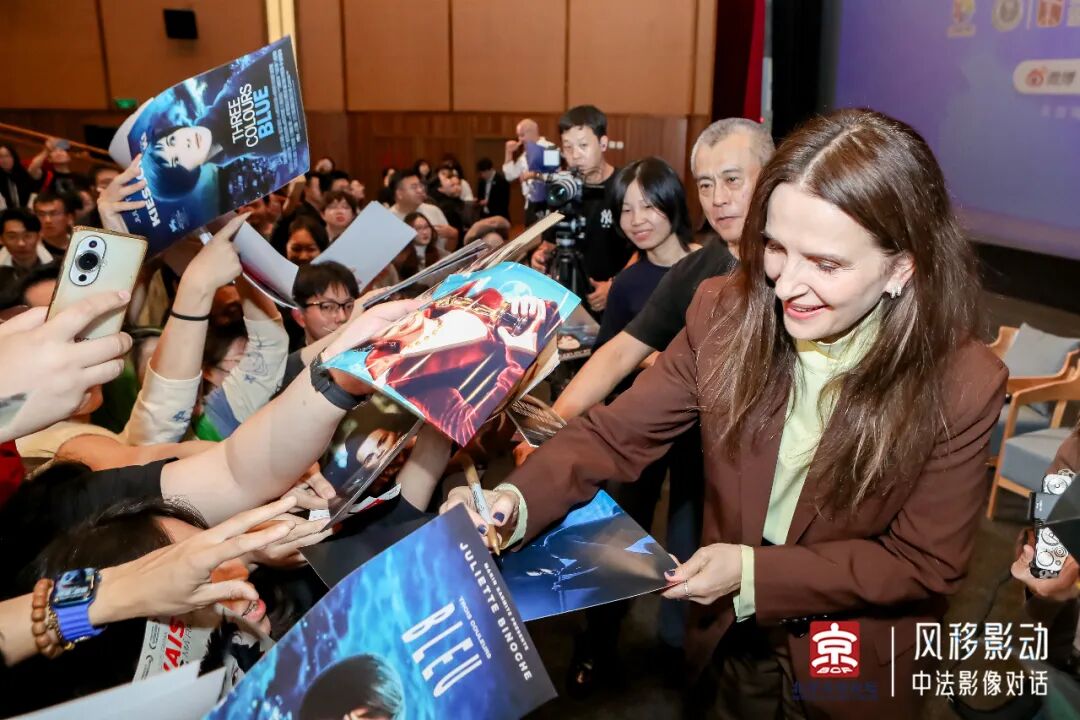
Juliette Binoche signs for the audience on site
At Beijing Film Academy, renowned French director Jean-Jacques Annaud and Chinese director Wuershan engaged in a dialogue that transcended culture, generation, and creative philosophy.
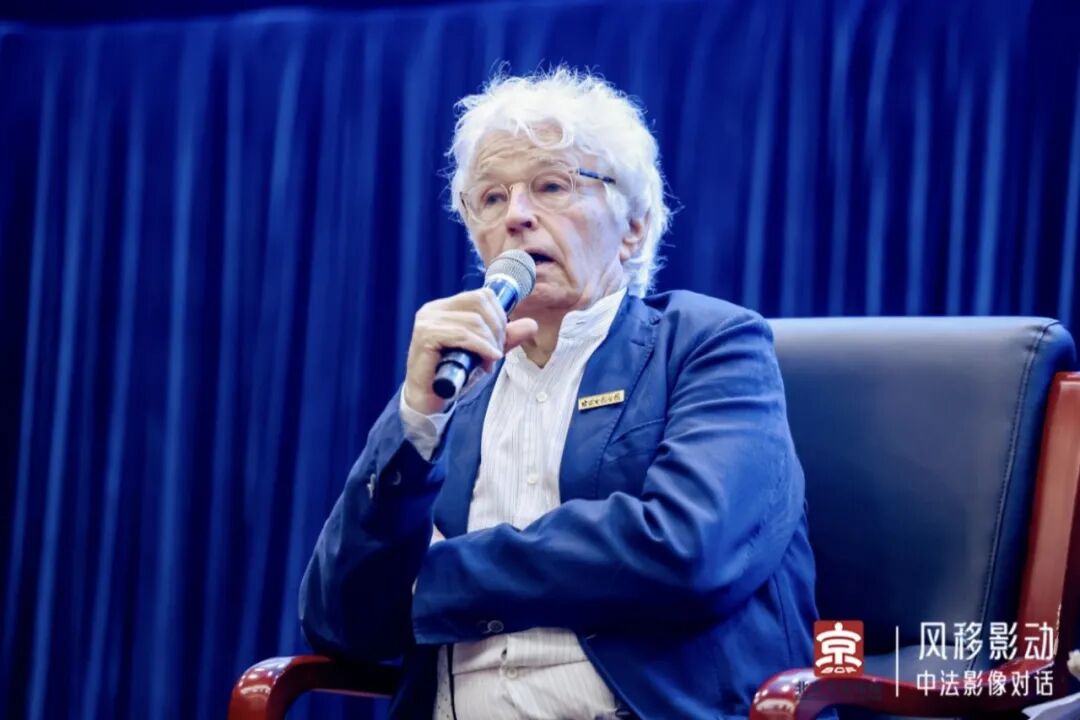
Jean-Jacques Annaud
Both directors agreed that the core of filmmaking lies in emotional resonance and visual expression. Director Jean-Jacques Annaud emphasized the importance of visual language and physical movement in breaking down cultural barriers, suggesting that filmmakers look beyond surface appearances to uncover universal human empathy. Director Wuershan pointed out that creators need to capture "emotional events that move themselves" and seek out narrative scenes "that only cinema can present," establishing emotional intensity and cinematic essence as the foundational basis of creation.
In terms of team building and international cooperation, Jean-Jacques Annaud used the metaphor of an "orchestra conductor" to stress that respect and cooperation are the essential foundations for uniting a transnational team, specifically praising the professional capabilities of Chinese filmmakers. Wuershan, shared his experience assembling talent from 21 countries for Creation of The Gods. He advised young directors to form core teams with classmates while proactively seeking collaboration with more accomplished professionals to enhance creativity through diverse exchanges.
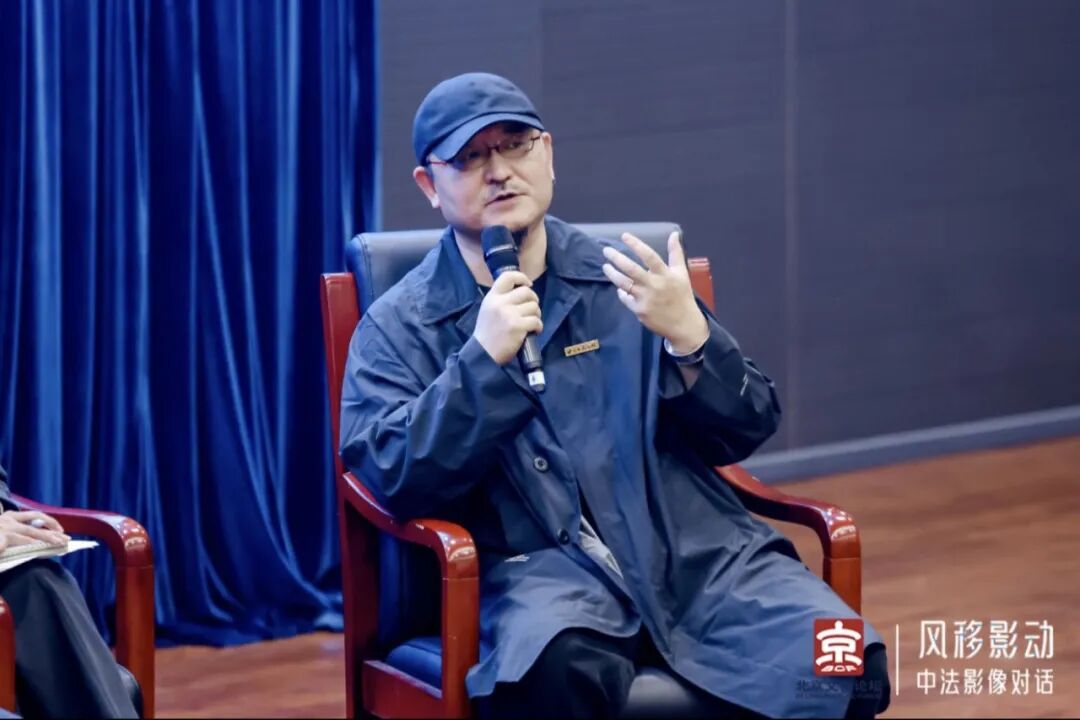
Wuershan
Addressing young people dedicated to the film industry, Jean-Jacques Annaud encouraged them to "always preserve the eternal impulse to tell stories", asserting that a director's mission is to convey souls through imagery. Wuershan advised to "avoid relying on advice given by others", emphasizing the crucial importance of building a personal creative system through practical experience. On the topic of technological development, both filmmakers agreed that AI is only an assistive tool, not a creative entity, and expressed hope for its evolution into an independent artistic language.
This dialogue not only highlighted the common artistic pursuits of filmmakers from both countries but also reflected the depth and breadth of Sino-French cultural exchanges. From Wolf Totem to Creation of The Gods, from visual presentation to team collaboration, the directors' sharing demonstrated the unique power of cinema as a cultural bridge, injecting new inspiration and vitality into future cooperation and innovation for Chinese and international film practitioners.
Carmen Chaplin, Charlie Chaplin's granddaughter, presented her documentary Chaplin: Spirit of The Tramp at Beijing Normal University for a screening and exchange event. The film traces the family's roots as its main narrative thread, focusing on the discovery of Chaplin's Gypsy heritage. It presents an emotional dialogue across three generations by combining archival footage, animation, and contemporary interviews.
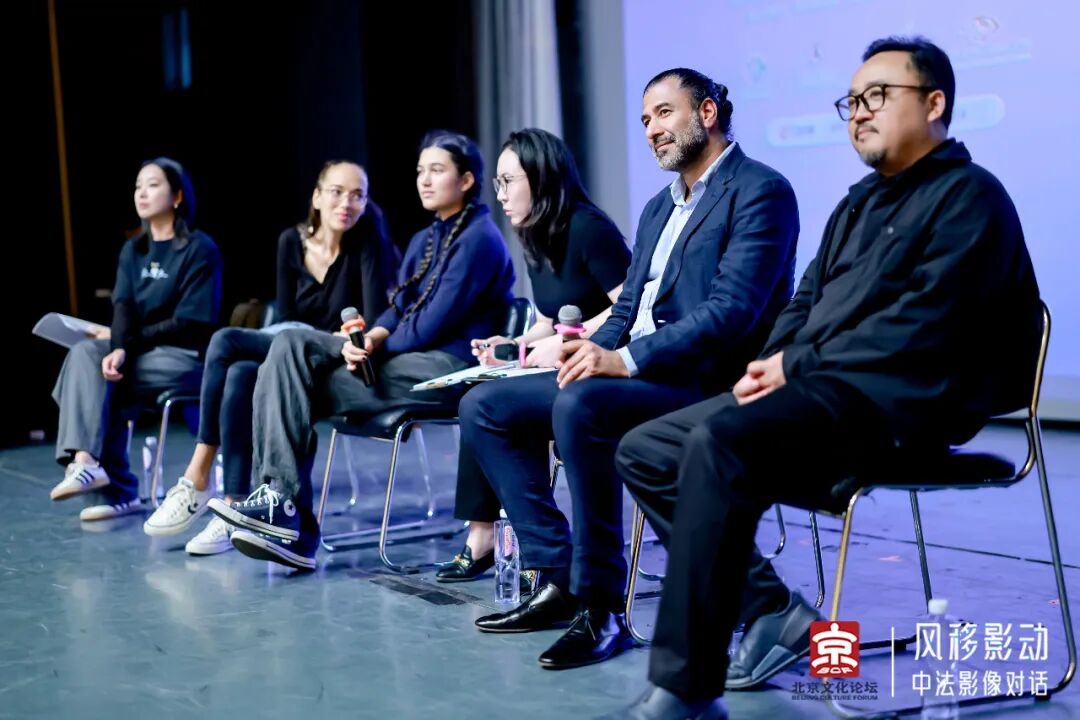
The dialogue session
Director Carmen explained that the creative impetus stemmed from her father's exploration of their family lineage. By drawing upon the "wandering" imagery in Gypsy culture, the film connects with the classic tramp character in Chaplin's movies, revealing the profound link between his artistic spirit and identity formation. The producer noted that the film was a co-production between France, Spain, and the UK, facing challenges inherent in coordinating multinational teams and integrating funding - particularly in balancing the costs and expressive needs between documentary filming and animation production.
During the post-screening discussion, invited guest Mei Wei, the great-grandson of Mei Lanfang, shared his reflections. He recalled the historic 1930 meeting between Mei Lanfang and Charlie Chaplin, an artistic dialogue between two legendary families spanning a century. Audience questions included the film's structure, the purpose of the animation, and the reasoning behind editorial decisions. Carmen emphasized that documentary creation necessitates constantly refining the focus based on the available materials, whereas the producer emphasized the critical importance of "thematic focus" in narrative pacing. Regarding the interpretation of the theme "Spirit of the Tramp", the producer described it as "exploration within uncertainty", which is consistent with the fluidity of Gypsy cultural traditions. He encouraged young creators to return to their original creative impulses and use "whether it moves oneself" as a guiding principle, retaining the courage to experiment throughout the lengthy production process.
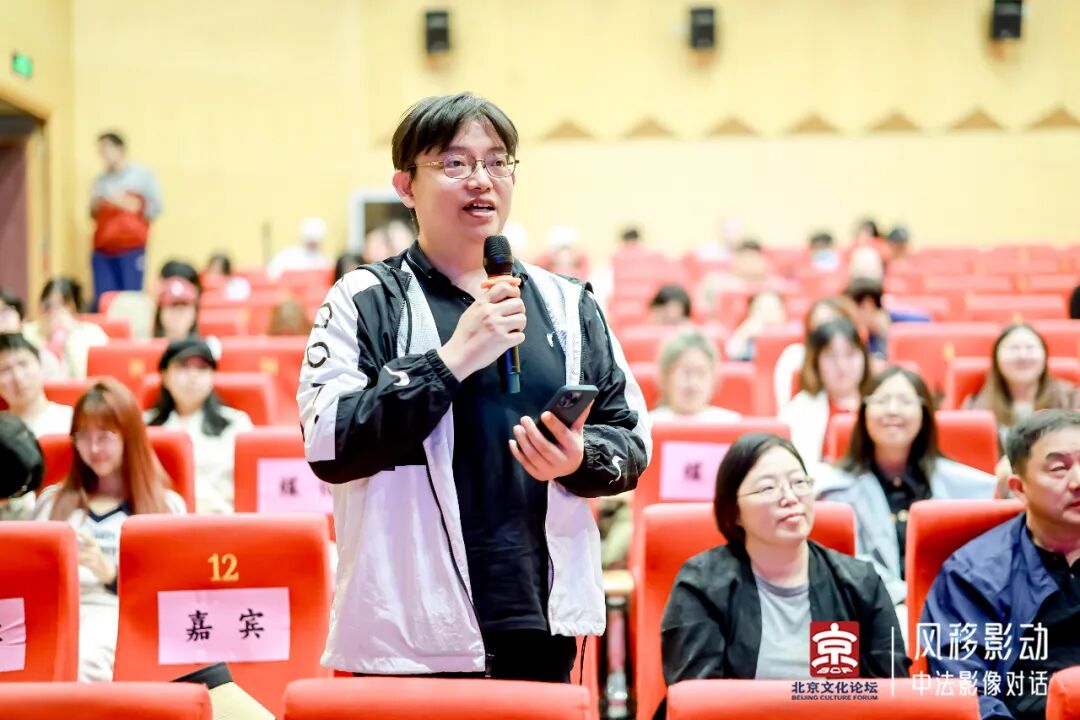
Mei Wei
At the China Film Archive, a specialized lecture on film heritage preservation and audiovisual archive management was successfully held. With its high-level academic content and forward-thinking international perspective, the event facilitated in-depth dialogue and practical cooperation between China and France in the field of cinematic cultural heritage.
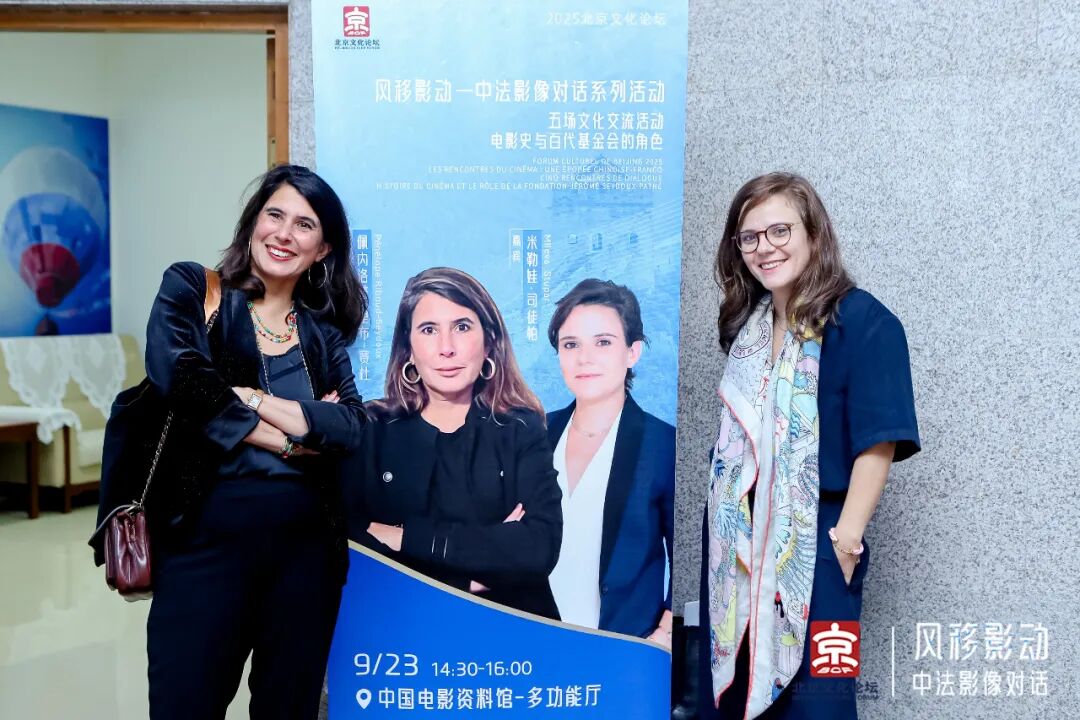
Pénélope Riboud-Seydoux (left) and Mileva Stupar (right)
Ms. Pénélope Riboud-Seydoux, President of the Pathé Foundation, delivered a systematic overview of Pathé's glorious history and its profound connections with China, spanning from early film imports and star-driven phenomena to its pioneering role in the film industry. She elaborated on the foundation's vast collection—which includes 2,500 silent films and 3 million photographs, among other items—and its ongoing work in restoration, dissemination, and education. Stating that "the history of cinema is a living history, constantly being rewritten", she highlighted the contemporary significance of heritage preservation.
Mileva Stupar, Head of the Cultural Heritage Department at Institut national de l'audiovisuel (INA), showcased cutting-edge practices in the digital era. She demonstrated how INA utilizes artificial intelligence and "data lake" technology to manage its collection of over 25 million hours of audiovisual materials. She also highlighted how digital solutions and new media strategies are successfully engaging younger audiences, thereby reactivating the value of cultural heritage.
This event was more than just a sharing session for advanced expertise; it demonstrated the importance of BJIFF as a national-level platform for gathering international resources and developing a cross-cultural exchange system for cinematic art. Through in-depth dialogue, it further revealed the consensus between China and France in areas such as heritage preservation, revitalization, and advancing into the digital future, injecting new vitality into the future cultural exchange and cooperation in film between the two countries.
These five captivating dialogue events have constructed a profound practice of civilizational mutual learning. Juliette Binoche's steadfast commitment to "inner truth", Jean-Jacques Annaud and Wuershan's exploration of a "universal visual language", Carmen Chaplin's quest for "cultural roots", and the joint guardianship of "civilizational memory in the digital age" by both countries - all reveal that cinema is, at its essence, a tangible philosophy. It explores not the differences in stories, but the ultimate questions of existence, memory, and belonging that humanity collectively faces. China and France, as representatives of profound history and powerful cultural influence, are using moving images as a "global language" to deepen dialogue from cultural surface to civilization's very core. True cultural dialogue transcends mountains, rivers, and time, finds resonance in differences, and ultimately realizes a human spiritual community with "beauty in harmony".
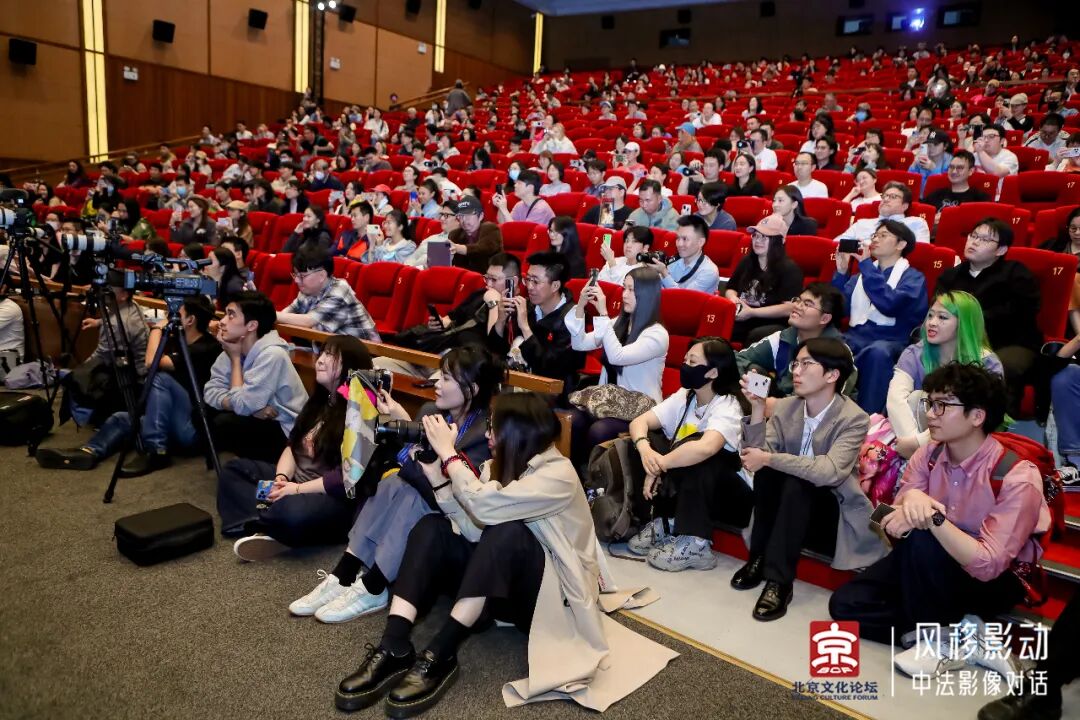
Event Site
Spiritual Resonance, Humanistic Adherence: Sino-French Film Salon Explores a Cross-Cultural "Global Language"
On September 24, 2025, the "Salon du dialogue Chine-France" was held at the National Museum of China in Beijing. As a key segment of the "Images En Mouvement: Dialogue Chine-France", the event acilitated in-depth exchanges centered on the theme "De la Nouvelle Vague aux nouvelles expressions: la réponse du cinéma chinois et français à l’air du temps.". The salon brought together distinguished guests from both China and France, including: Li Wentang, Vice President of Party School of the Central Committee of CPC and Vice President of the National Academy of Governance; Sun Junmin, Member of the Standing Committee of the Beijing Municipal Committee and Minister of the Publicity Department of the CPC Central Committee; Sophie Lotkoff, Vice President of the Auvergne-Rhône-Alpes Region, France; Chen Mingjie, Director of the Culture and Arts Bureau of the Publicity Department of the CPC Central Committee; Luo Yang, Vice Director of the Film Bureau of the Publicity Department of the CPC Central Committee; Florent Aydalot, Minister-Counselor for Cultural, Educational and Scientific Affairs at the French Embassy in China and Director of the French Cultural Centre in Beijing; Ding Pengbo, Deputy Director of the National Museum of China; Yu Junsheng, Deputy Director of the Publicity Department of Beijing Municipal Committee of CPC and Head of Beijing Radio & Television Station (BRTV); Huo Zhijing, Deputy Director of the Publicity Department of the Beijing Municipal Committee of CPC and Director of the Beijing Municipal Film Administration; Christine Cayol, Founder of Yishu 8 Association (Paris) and Vice President of the Sino-French Cultural Forum; Hervé Machenaud, Former Executive Vice President of Électricité de France; Yin Hong, Professor at Tsinghua University and Vice Chairman of China Film Association; Liu Chun, Deputy General Manager of China Film Group Corporation; Xue Xiaolu, renowned director, screenwriter, and producer; Ning Ning, a practitioner of Sino-French cultural exchange and a senior international co-production producer; French film representatives including director Jean-Jacques Annaud; Jean-Paul Tchang, Chairman of the CDCC (Centre de Documentation sur le Cinéma Chinois); Pénélope Riboud-Seydoux, President of the Jérôme Seydoux-Pathé Foundation; Carmen Chaplin, director and actress; and renowned film critic Zhou Liming. The participants engaged in thorough discussions on film and cultural exchange, jointly promoting Sino-French cinematic collaboration to new heights.
The first roundtable forum, themed "Un Siècle de Cinéma Franco-Chinois", reviewed the transformative impact of the French New Wave on global film language, as well as the explorations in realism and visual poetics by China's Fifth and Sixth Generation directors. French director Jean-Jacques Annaud pointed out that while the New Wave brought creative freedom, there is also a need to be vigilant about its long-term risk of homogenization. Yin Hong, Professor at Tsinghua University and Vice Chairman of China Film Association, emphasized that the New Wave shifted cinema's focus from narrative to a deeper concern for humanity, thereby enhancing the expressive capacity of imagery and strengthening directors' sense of authorship.
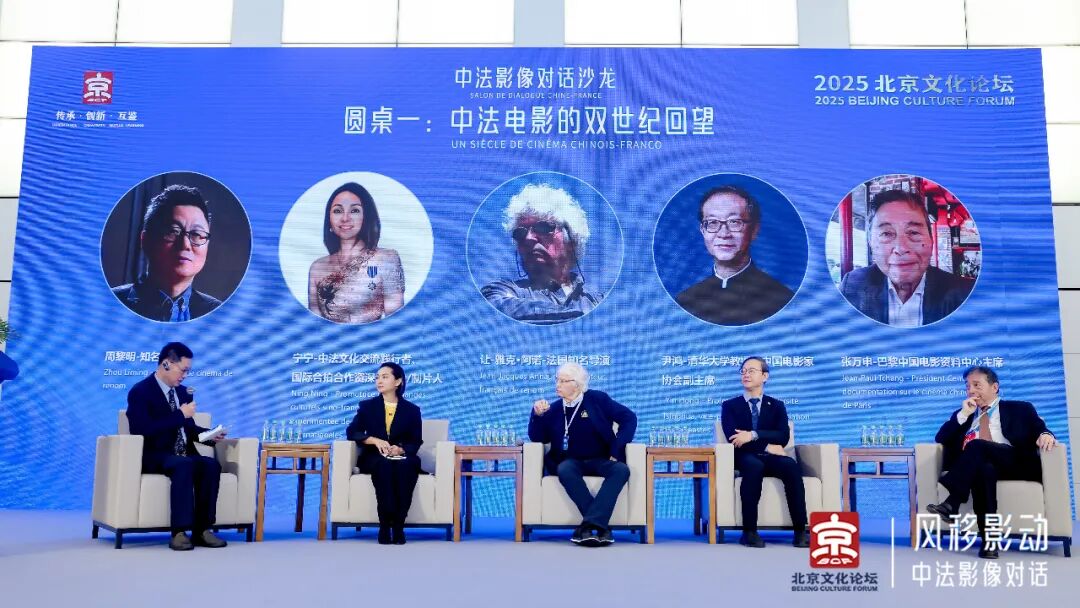
The first roundtable forum
The second roundtable forum, focusing on "Nouvelle Ère Cinématographique Franco-Chinoise", analyzed pathways for future collaboration. Director Xue Xiaolu shared how the French Left Bank cinema movement has inspired cross-cultural creation, highlighting that shared human emotions are key to transcending cultural barriers. Liu Chun from the China Film Group Corporation used The Wandering Earth as a case study to elaborate on integrating traditional Chinese culture with global issues. On the technological front, participants discussed the potential and limitations of artificial intelligence in film restoration and production, emphasizing that technology should support artistic expression rather than replace humanistic reflection.
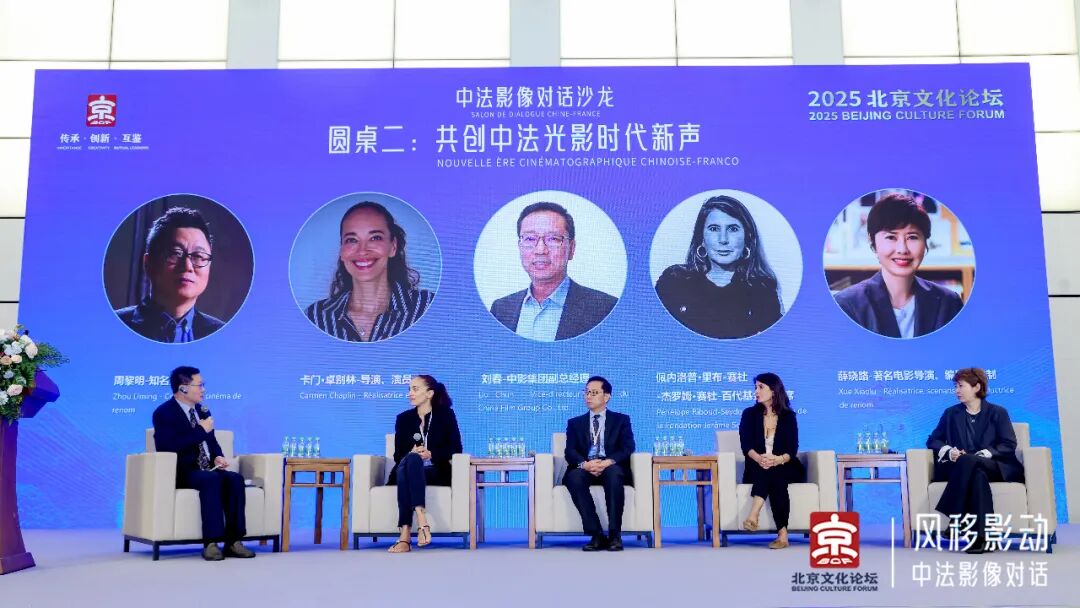
The second roundtable forum
This salon, held at the historic confluence of the 130th anniversary of French cinema, the 120th anniversary of Chinese cinema, and the 61st anniversary of Sino-French diplomatic relations, is essentially a profound dialogue of civilizational significance. The core of this dialogue between Chinese and French filmmakers is that two major civilizational systems seek resonance deep within their cultures via the global language of moving images. From the aesthetic liberation of the New Wave to the contemporary reimagining of Eastern poetics, from exploring co-production models to safeguarding digital heritage, the cinematic development of the two countries, despite different paths, converges towards the same goal, jointly affirming the fundamental logic of civilizational innovation and transformation. True cultural vitality stems from a thorough exploration of the local spirit and a response to universal human issues.
The future of Sino-French cinematic collaboration lies on a path of co-creation. Moving beyond the material needs of financing and markets, both sides are reaching a new stage of aesthetic language integration and cultural gene recombination. This involves achieving interoperability in the underlying emotional grammar of storytelling and complementing civilizational perspectives at the spiritual core, ultimately allowing a new civilizational fruit to grow from our shared human cultural roots.
This collaborative model, premised on respecting differences and aimed at co-creation and symbiosis, is reshaping the paradigm of bilateral cultural exchange. It has significant instructive implications for the global civilizational dialogue at a crossroads. Cooperation does not imply the dissolution of cultural boundaries; rather, the expansion and enrichment of our spiritual worlds is accomplished by maintaining subjectivity while engaging in deep mutual interpretation. It vividly embodies the civilizational wisdom of "harmony in diversity." Cinema truly becomes a spiritual light source, illuminating humanity's shared future, precisely when difference and commonality interact so profoundly.
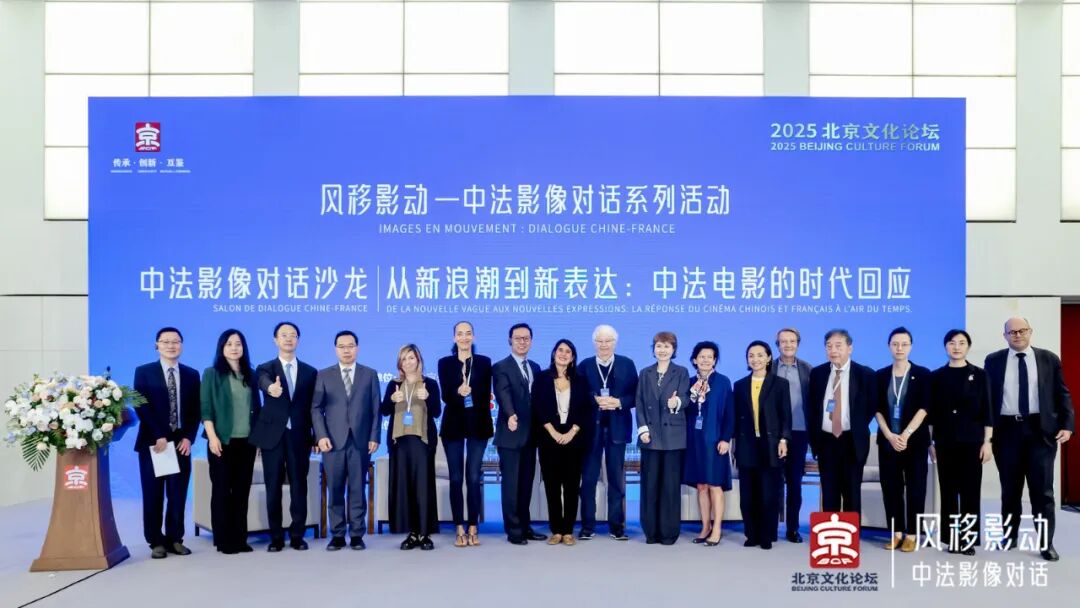
Group photo at the Salon du dialogue Chine-France
Cinema, like a flowing poem, serves as a "universal language" that reaches across mountains and rivers. From the luminous river of images created through collaboration between Chinese and French filmmakers to the joint explorations of heritage preservation and the digital future by both countries' cultural institutions, this event is more than just a nostalgic look back at a century of cinematic history; it is a practical endeavor in building a community with a shared future for humanity. This cultural dialogue, which seeks common ground while respecting differences, begins with respect for diversity, the pursuit of empathy, and an embrace of innovation. Standing at this new starting point, sixty years after the establishment of Sino-French diplomatic relations, the two countries are using a bridge of moving images based on humanistic values to continue building consensus through civilizational exchange. By drawing inspiration from collaborative reservoirs, we are ensuring that cinema is more than just a tool for recording our times, but also an enduring light that illuminates the human spirit, injecting cultural impetus into global civilizational exchange and the promotion of world peace and stability.

